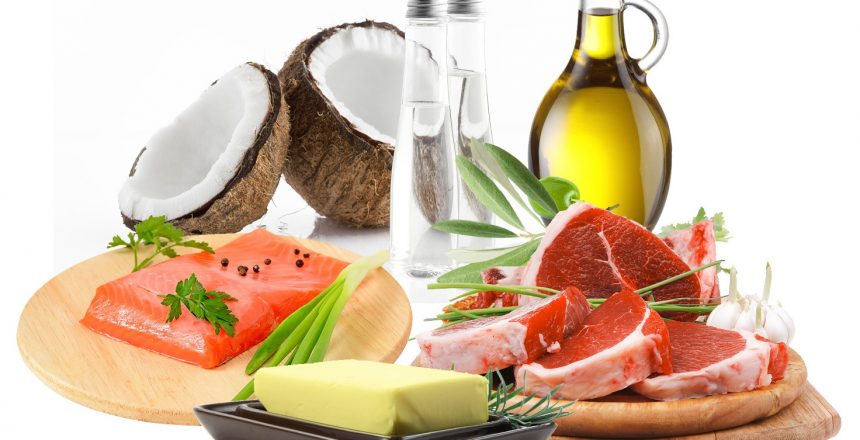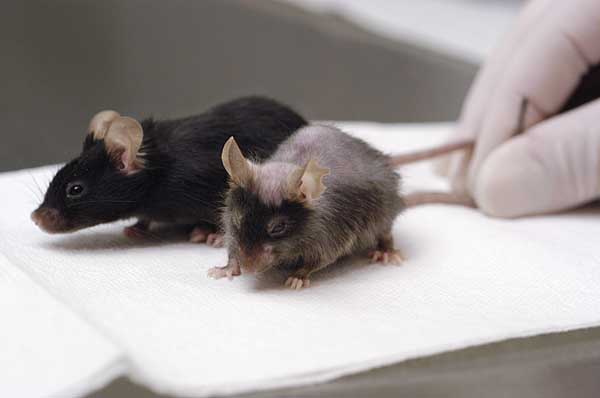Low carbohydrate consumption and ketones
A ketogenic diet is characterized by the production of ketones, small molecules that the body can use as alternative energy sources. These molecules — beta hydroxybutyrate, acetoacetate, and acetone — are produced when carbohydrate consumption is very low. Depletion of glycogen, the storage form of carbohydrate, results in the production of ketones from fatty acids.
Intermittent fasting also causes the production of ketones, since if you’re not eating anything, you’re not eating carbohydrates either.
How low does carbohydrate consumption need to be to cause the production of ketones? The amount varies, and most people will need to eat 50 grams or fewer carbohydrate daily to see a rise in ketones. People who are very physically active, such as through daily strenuous exercise, may be able to eat 100 grams or more and still be in ketosis.
Ketones are used as an alternative to glucose. The body only carries about a 24-hour supply of glycogen — which is broken down to glucose — but the supply of fat is enough to last for weeks or months, depending on how much fat the person has. So after a period of about 24 hours with minimal carbohydrate intake, the production of ketones ramps up.
Just to be clear, the ketones under discussion here have nothing to do with raspberry ketones, which are a current weight-loss fad and appear to be ineffective for that purpose.
Health benefits of ketogenic diets
Ketones and the ketogenic diet have a number of health benefits.
- The ketogenic diet has strong anti-seizure properties. Many children and adults with epilepsy, whose condition cannot be treated with drugs, become seizure-free with a ketogenic diet.(1) The effect may be due to increased mitochondrial energy production in the brain.
- Ketones and the ketogenic diet may be useful in the treatment of Alzheimer’s disease.(2) A case that was in the news not long ago was of a doctor who treated her husband’s Alzheimer’s disease with coconut oil, which metabolizes to ketones. The treatment was quite successful.(3)
- The ketogenic diet may be useful for insulin resistance.(4)
- The ketogenic diet may help treat cancer.(5) Cancer cells thrive on glucose, so keeping blood sugar low may be therapeutic.
- Finally, the ketogenic diet can be used for fat loss, the Atkins diet being a notable example.(6)
The benefits of the ketogenic diet could be due to several things, for example to the absence of carbohydrate, to the presence of ketones, a decrease in insulin, or even increased consumption of fat. Or possibly to all of these.
The absence of carbohydrate in the diet leads to lower insulin levels, and this in turn allows fat to leave fat cells and be burned as energy. Hence the fat-loss effect of low-carbohydrate diets.
As noted, after 24 hours or more of carbohydrate restriction, ketones begin to be produced, and the presence of ketones and not the absence of carbohydrate seems to be the cause of the beneficial effects of the ketogenic diet in epilepsy and Alzheimer’s.
Ketones suppress hunger
It’s also widely suspected that ketones suppress hunger. They may be the cause of the absence of hunger during prolonged fasting. Many people report that as they begin to fast, they’re hungry, but their hunger goes away as they extend their fast.
The disappearance of hunger has certainly been my experience in fasting, especially if the fast lasts more than about 16 hours. What’s probably happening is that ketone levels increase in the bloodstream, and this suppresses hunger.
The fact that many of the benefits of the ketogenic diet may be due to the ketones themselves opens the way for exogenous ketone supplements. In theory, someone could take one of these supplements to get the benefits without even restricting their carbohydrate intake.
Exogenous ketone supplements
I recently received a sample of KetoCaNa, an exogenous ketone supplement.
KetoCaNa contains beta hydroxybutyrate, one of the ketones normally produced by a ketogenic diet, and is flavored (“natural flavors”) and sweetened with stevia, a non-caloric sweetener.
I’ve used it several times now, and I can report that it works.
Works for what?
For one thing, it suppresses hunger, just as suspected. I’ve taken it several times in the morning during an intermittent fast. Hunger just goes away.
I’ve also taken it (twice) before lifting weights. Ketones may possibly be used as an alternative fuel during exercise, and thus may boost exercise performance.(7) My own experience here is less definite. Maybe it works. But the high-intensity protocol that I’ve begun practicing lately is so short — typically under 40 minutes — that I probably don’t need an alternative fuel source. I suspect that in a longer exercise bout, say cycling or running, ketones may make more of a difference. But I don’t know, since I don’t do those things.
By suppressing appetite, KetoCaNa could be useful for weight loss. Ketone supplements lead to lower body weight in rats.(8)
One drawback of KetoCaNa: the stuff is expensive. A full serving will run you over $4.00. However, half a serving seems to work well too.
The best way to use it is to take it during a fast, so ketone levels are increased. It will increase ketones if you’ve been eating as well, but that would negate many of the weight-loss benefits.
KetoCaNa may prove to be useful in treating Alzheimer’s, cancer, and epilepsy, but that remains to be seen. Most of those who take it now seem to be athletes.
There’s a newer entry into the ketone supplement line, Pruvit Keto // OS. I haven’t tried it.
MCT oil
Another, cheaper way to raise ketone levels is with MCT oil, which consists of medium-chain triglycerides which rapidly metabolize into ketones. MCTs seem to be difficult or impossible to store as fat, and a diet that included MCT oil resulted in significantly more fat loss than did a diet that contained olive oil, in humans.(9)
A tablespoon of MCT oil ought to do the job. Some people report stomach upset with MCT oil, but it’s never bothered me.
Another good reason to take exogenous ketones or MCT oil during an intermittent fast is because ketones stimulate autophagy, the cellular self-cleansing process.(10)
Increased autophagy is one of the main health benefits of intermittent fasting, and is mainly responsible for its longevity-promoting effect. Adding exogenous ketones while fasting ought to boost the autophagy process even more than fasting alone.
Conclusion
Many of the benefits of a very low carbohydrate ketogenic diet may be due to the presence of ketones. Exogenous ketone supplements can a) provide ketones even when not refraining from carbohydrates, and b) boost ketones even further when eating a ketogenic diet.
Lots of people who suffer from illnesses such as cancer or Alzheimer’s simply will not stop eating carbs. Crazy, I know, because if I had cancer I would do everything I could to treat it. But even a simple measure like cutting carbs seems beyond the reach of many. So ketone supplements may be able to fill in a gap in these cases.















16 Comments
If the goal is fat loss, I suspect that exogenous ketones would slow down fat loss. Why would the body tap into it’s own fat stores if it has an external source of energy (which would explain the absence of hunger).
Using it in a pre-workout would have it’s merits since it would be used to fuel higher performance within the workout (as an alternative to using glucose in the pre-workout). But at that cost, it’s an expensive pre-workout. I am curious about trying one of them though.
Re fat loss and ketones, the logic is certainly there, though I don’t know whether that really happens or what the mechanism would be. The supplement is low in calories, at 68 per full serving.
When are you taking the MCT oil?
Is their Keto8 product worthwhile?
MCT oil can be taken in the morning with coffee or just on its own – it’s practically tasteless. I don’t know enough about the Keto8 to say, but it looks worthwhile.
How long do you have to fast (zero calories) before you start producing ketones and using them to provide energy for the body’s various energy requirements. I got the impression from the post that it was 16 hrs, but then you also mentioned ketosis not commencing until after 24 hrs of fasting . I eat once a day now, so a fast of 22.5 hrs, so for some of that time will I be in ketosis ? Haven’t tried checking with Keto sticks. Maybe I should . I feel a kind of mild hunger about three hrs after rising which lasts about an hour, them it seems to dssipate until about an hour before I eat at 3pm.
Also, fermentable fiber (resistant starch, inulin, pectin etc. ) is used by gut bacteria to produce various short chain fatty acids , including butyrate. I’ve read that the ffa’s can be used as an energy substrate, but is that just by colonic bacteria, or does the energy somehow be used also by the rest of the body. And is butyrate itself a ketone, or does it have to undergo further transformation to become the ‘hydroxybutyrate’ you refer to..
Lastly, apparently long term VLC diets are a recipe for gut dysbiosis unless you also consume fermentable fiber (which doesn’t need to conain any digestible carbs at all) So if you ate (as an extreme case) zero carbs, but a lot of fermentable fiber ( i stress FERMENTABLE fiber, not the cellulose, which both from my experience and from my reading isn’t necessary at all), you could conceivably get all the neuro- protecctive benefits of ketosis, but also have a super well fed microbiome.
Or am I missing something?
Butyrate is not a ketone, and mostly it stays in the gut to be used by gut cells. FFAs are definitely used for energy by the body. As for fermentable fiber, it has benefits and won’t interfere with a VLCK diet.
I’ve been taking pruvit packs for 30 days I’ve lost 12 pds. Great appetite suppressant . I like the fact that if I screw up I can get back into Ketos quicker
Are you referring to this book? https://www.amazon.com/Cancer-Metabolic-Disease-Management-Prevention/dp/0470584920 I haven’t read it but it’s on my list. Was curious if its a source for you.
I haven’t read that book, but I’m familiar with Seyfried and his work, and I’ve read a number of his articles. Fascinating view of cancer and ketogenic diets, and very likely correct in my opinion. His theory makes more sense of the facts of cancer than other theories. Here’s his article with the same title as the book: Cancer as a Metabolic Disease.
I took my first dose of KetoCaNa today. It gave me a bit of a stomach ache that went away after about half an hour. I think that next time, I’ll just try a half dose. It did reduce hunger a bit, and did give me a bit of extra energy – nothing dramatic, but helpful. I’ll try tomorrow before a workout to see what happens. I did a Ketostix test before and about 1 1/2 hours after, and went from traces of ketones (around 5 mg/dL) to strong ketones (around 80 mg/dL).
Interesting, thanks for the report, Baron.
I ‘ve up my protein intake to 1.25 grams/lbs of body weight and have started taking 1 tablespoon of MCT with each meal as per this old school (1990s) body building book.
https://www.amazon.com/gp/product/0399517715/ref=oh_aui_detailpage_o05_s00?ie=UTF8&psc=1
I have lost about 5 lbs and 2.5 inches on my waist. I am tracking my food and exercise very closely to see that the effect are over a 4-6 week period.
My workplace receives a newsletter aimed at doctors and nurses, it contains recipes for sugar-bomb milkshakes aimed at patients undergoing Chemo! So crazy. And the cancer-wards at hospitals literally have huge freezers with icecream for the poor bastards who are there.
Not that all cancers can be beaten with fasting though, on Golodanie.su I’ve followed cancer logs, most people go into tumor remission during fasting but it comes back afterwards. Out of maybe ten people only two actually cured their cancer and those two individuals went on 40 day water fastes while suffering cancer! I guess I would try that too if my life was in danger.
Anyway, my experience with ketosis is that it can take up to 50 hours for the liver to run through all stored carbohydrates if I have consumed high caloric food prior to commencing fasting.
In nature periods of starvation probably commenced gradually, that’s why it’s good to ease into fasting by cutting the number and size of your meals over a couple of days prior to a true fast.
That is also the reason why it’s good to gradually restart food after fasting.
Many novices ruin their fast by drinking copious amounts of water, it will dilute the ketones in your blood, remove sodium and other minerals and kick-start the stomach to make you hungry. Only drink when you are thirsty, the body knows best. The body actually produces water from fat+oxygen during fasting.
People who are getting an upset stomach from MCT oil should start with very small amounts. Also, the cheapest MCT oil can be found in liquid forms of coconut oil. The organic brand I use is over 90% MCT and I use it for everything from cooking to adding it to my coffee.